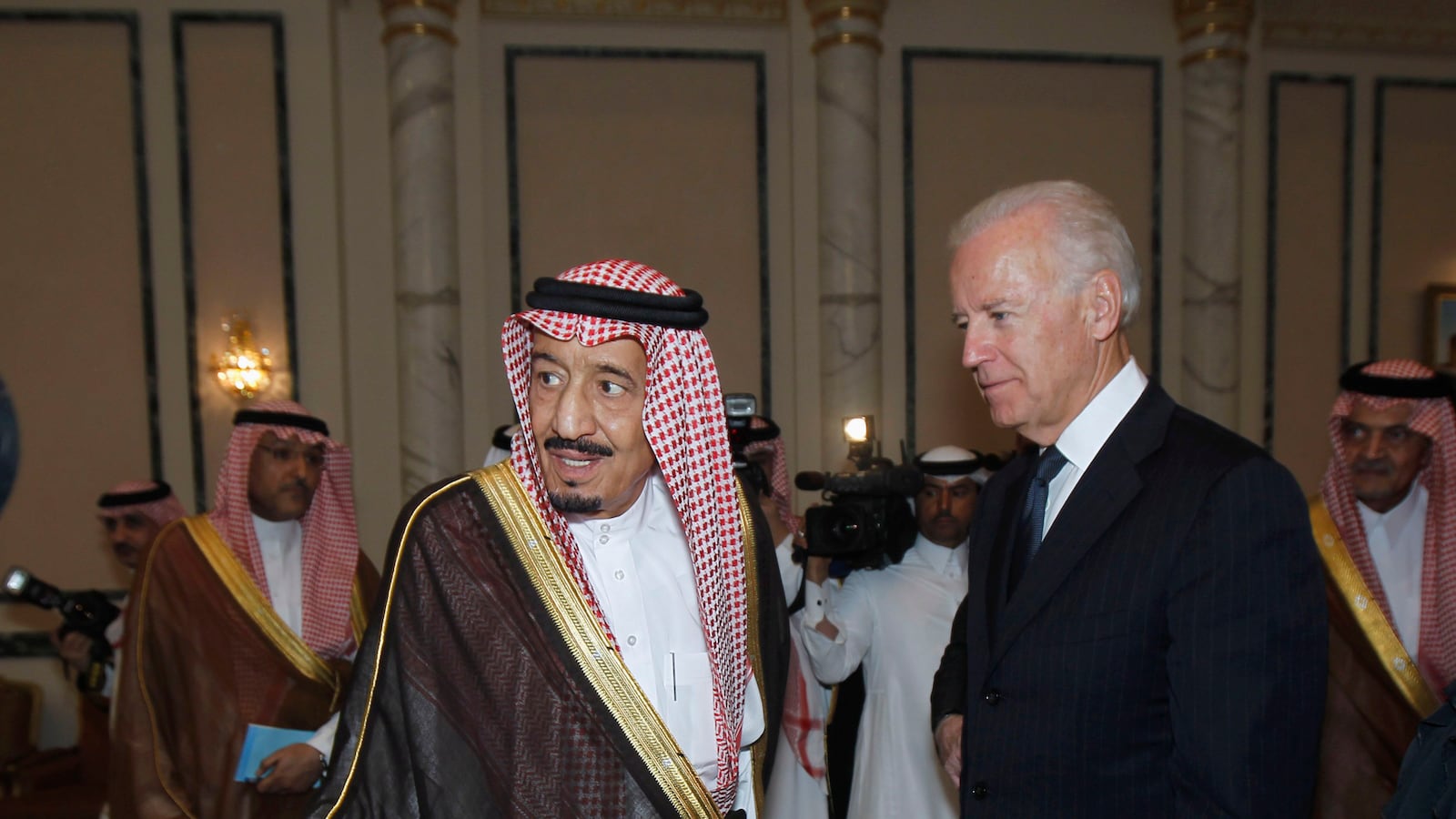One of the worst things you can say about a relationship is “it’s complicated.” At best, it projects a sense of futility about anything changing. At worst, it’s a disregard for your own self-worth.
If your partner literally kills and dismembers someone in your protection—and now everyone knows it for a fact—it says a lot (of the wrong things) when your response is still to shrug and say “it’s complicated.”
Yet that is the latest response from the United States in its longstanding, toxic relationship with Saudi Arabia. This affair has involved decades of arms sales, a co-dependence on fossil fuels, and covering up for the cruelties of the Saudi royal family, all in the name of dubious shared regional objectives. Under the past president, the relationship reached new depths: mutual orb touching, group sword dancing, and having each others’ numbers on speed dial. Trump was so proud of this alliance that he openly bragged about saving the Saudi Crown Prince Muhammad Bin Salman’s ass from Congress.
That was after MBS killed Jamal Khashoggi, a well respected journalist and dissident living in the U.S., who was exposing the ugly truth behind the crown prince’s PR campaign about Saudi Arabia’s supposed progress as women and human rights activists were being imprisoned at home and critics hunted abroad. In 2018, Khashoggi, looking to marry his Turkish fiancé, was lured to the Saudi embassy in Istanbul with the promise of the documents he needed to certify his marital status. There, agents reporting to MBS, killed him, sawed his body apart, and disappeared the remains in a calculated, brutal attack meant to send a message that no one should dare question the Kingdom and its rulers.
But Joe Biden heartily campaigned on holding Khashoggi’s killers accountable, stating that “there is very little social redeeming value in the present government in Saudi Arabia. They have to be held accountable.” He promised to “make them pay the price and make them the pariah that they are.”
Early signs indicated that Biden was on track to rebalance U.S. engagement in the Middle East. He complied with Congress’ long standing desire to halt the sale of weapons being used by Saudi Arabia to kill people in Yemen. The White House sharply reminded reporters earlier this month that Biden’s counterpart was not the crown prince, but King Salman. These signals had people—regular news readers as wells as foreign policy watchers—anticipating accountability for Khashoggi’s murder.
So when a long anticipated U.S. government intelligence report was released on Friday, one that flatly declared that “We assess that Saudi Arabia’s Crown Prince Muhammad bin Salman approved an operation in Istanbul, Turkey to capture or kill Saudi journalist Jamal Khashoggi,” it was shocking when the administration took no direction action at all against MBS in effect since that could have complicated US interests in Saudi Arabia.
But being complicated is the baseline for foreign relations. Especially in the Middle East. Biden knows that better than anyone, having been involved directly in U.S. global engagement for decades. Saying “it’s complicated” is the worst non-answer you can give when explaining a national security issue or decision to the public. It’s a statement of fact. You might as well say, “well, the desert has extreme temperatures. It can get really hot. And really cold.” And it’s an insult to your audience to expect them to be satisfied with just that.
A senior administration official admitted as much, saying the information released on Friday was not new and had been known to the U.S. government for more than a year. In theory, that meant plenty of time for the team to plan out its response scenarios to be in line with Biden’s past statements and expectations that this administration would work to restore American global leadership and values driven policies.
And that’s ultimately the failure of this moment in the U.S.-Saudi relationship. Sanctions directly on MBS were not the only tool that could have been leveraged but was not. (To its credit, the administration did sanction dozens of other people.) A former Middle East negotiator, who served under presidents from both parties, pointed out that the president or the secretary of State could have acted on and spoken publicly about any of these actions: demanding the release of dissidents, suspending arm sales, cutting off U.S. officials from engaging with the crown prince.
After all, the negotiator said, “they need us more than we need them.”
Any of these active responses would be better than hiding being a statement of fact that the U.S.-Saudi relationship is complicated. Of course it is. That explanation obscures what people know intuitively about human behavior. When you choose not to hold bad behavior to account, it is simply because you don’t want to deal with the fallout, and not dealing with the problem is very different than actively working to do the right thing. You are far better off making a relationship decision that centers your own sense of humanity and self-respect.
Call it what you will, but “complicated” it isn’t.








